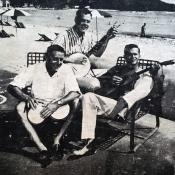 From Wikipedia, the free encyclopedia
From Wikipedia, the free encyclopedia
The Kingston Trio is an American folk and pop music group that helped launch the folk revival of the late 1950s to early 1960s.
The Kingston Trio was formed in 1957 in the Palo Alto, California, area by Dave Guard, Bob Shane, and Nick Reynolds, who were just out of college. Greatly influenced by The Weavers, the calypso sounds of Harry Belafonte, and other folk artists such as the Gateway Singers and the Tarriers, they were discovered playing at a Menlo College-area club, the Cracked Pot, by Frank Werber, a publicist then working at San Francisco's hungry nightclub. He became their manager, and secured them a one-shot recording contract with Capitol Records. Shane would later tell concert audiences that the group considered itself at first to be primarily a calypso group, and therefore named itself after the capital of Jamaica.
The group's first hit was a catchy rendition of a traditional folk song, "Tom Dooley", based upon the life of the tragic figure, Tom Dula; it earned a gold record in 1958. It was so popular that it entered popular culture as a catchphrase: Ella Fitzgerald, for example, parodies it during her recorded version of "Rudolph the Red-Nosed Reindeer". It won the trio the first Grammy award for Best Country & Western Performance, at the awards inaugural ceremony in 1959. The next year, the group won the first Grammy Award for Best Ethnic or Traditional Folk Recording for the album The Kingston Trio at Large.
At one point in the early 1960s The Kingston Trio had four albums at the same time among the Top 10 selling albums, a record unmatched for nearly 40 years. In spite of this, they had a relatively small number of hit singles.
The group's music was simple and accessible, with much use of tight vocal harmony, signature riffs (often played on the banjo), and repetitive choruses. Capitol producer Voyle Gilmore enhanced their vocal sound with reverb and the relatively new process of doubletracking, in which the performers sang along with their own prerecorded part to produce a stronger sound than with a single voice, in part due to a natural gap of a fraction of a second between the original recording and the overdubbed part. At first, pairs of tape recorders were used, then later multitrack recording machines, to produce the effect.
Several of the group's most popular songs were humorous numbers, such as "Tijuana Jail", the tale of an ill-fated trip to Mexico, and "M.T.A.", the saga of a man who "never returned" from the Boston subway system. A concert favorite was the darkly humorous "Merry Minuet", a tuneful meditation on the prospect of nuclear war.
Guard left the band in 1961 as part of a disagreement over its musical direction and with the way their publishing earnings were being handled. He formed the group Whiskey Hill Singers, and was replaced by John Stewart, who led the group through several more years of popularity until the arrival of The Beatles and British invasion rock bands pushed them from the charts.
Guard died of lymphatic cancer in 1991, and Stewart of a massive stroke (or possibly aneurysm) in 2008, leaving Reynolds and Shane as the two surviving original (and heyday) members.
The Trio (in its original incarnations) disbanded after a final performance at the hungry i on June 17, 1967 (skipping an encore to attend the nearby Monterey Pop Festival). Shane, the lone member to resist the breakup, started a new group, aptly named The New Kingston Trio in 1969 with Jim Connor and Pat Horine. He eventually reached a contractual agreement with his former partners, Guard, Reynolds, and Werber, to secure and license once again the original name, The Kingston Trio, in 1976.(Blake et al. 1986.) Shane continues to have rights to the name as of 2008.
Stewart, who wrote the Monkees hit "Daydream Believer" and recorded nearly four dozen solo albums, and scored a Top 10 hit single of his own in 1979 with "Gold", died on January 19, 2008 of a brain aneurysm at a San Diego, California hospital.
By 1973 the trio was Shane, Roger Gambill, and Bill Zorn. Zorn left in 1976, and was replaced by George Grove. Bob Haworth, a member of The Brothers Four from 1970 to 1985, sang with the Trio from 1985 until 1988, filling in for Gambill, who was hospitalized, and eventually replaced him when Gambill died that year. In 1988, Nick Reynolds, one of the original three members, returned, replacing Bob Haworth. Reynolds retired in 1999, and Haworth returned to the Trio through 2005.
In 2005, Shane retired from the group due to health problems. He was replaced by the returning Bill Zorn, leaving The Limeliters, who he'd been a member of in the 1990s. Also coming from the Limeliters was Rick Dougherty, who replaced Haworth, who'd also left the group.
As of 2006, The Kingston Trio consists of George Grove, Zorn, and Dougherty.
Through the years, the most requested song for The Kingston Trio was "Scotch and Soda", which was always performed as a solo number by Shane. The trio discovered this song through Tom Seaver's parents, who had first heard it when on their honeymoon. One member of the trio was dating Seaver's older sister at that time, and heard the song on a visit to the Seaver home. Although it is credited to Dave Guard, the trio never did discover the real songwriter's name, though they searched for years.
Since Shane's retirement, the song is only rarely performed live, and sometimes as a solo by one of the current members and at others in an audience sing-along.